Russel Swensen (@scribblymouse)
Selected Tweets
so no i don’t exactly think there’s hope for any of us ok
ice isn’t melting btw it’s rejecting you
can’t tell if this sunshine is trying to be ironic or what
not a statue i just stay still a lot
what if you “listened to your body” and all it said was “goodbye”
the furniture seems to be a lot more on fire since i started thinking of you
*pregames with bone marrow*
my fantasy is a room you’re not walking out of
writing “who did this to you” as the caption to every childhood photo of yourself you can find
there are a lot of cups of coffee but this one hasn’t betrayed me or made me feel worthless yet
i’m the part of the story you fall asleep during
how old is your depression supposed to be before you talk about girls
i like to drive real slow like my life isn’t meaningless
what’s the yoga position where i lie down in your driveway and promise not to breathe
yelling at my blood that it’s not allowed on the bed
twisted dark fantasies about emotional stability
point a camera at me and watch it detonate
now count back from you miss her but she doesn’t miss you
every five minutes i whisper “it sounds like someone’s dying out there” and even i do not know what I mean
teaching the baby how to say yeezy
have your funeral at a poetry reading so you can blame poor attendance on the genre
put my name in your bio wrap it up in a blanket and weigh it down with rocks drop it off the pier
your heart’s first words were “no touching.”
there is cornbread in my tears tonight
i thought i was in love but it turns out i just left the oven on
gonna take your temperature by burning you at the stake
“i always wanted to fuck the most depressed cheerleader in the world”
“you’re making it worse” me every time i look in a mirror
smh if your entire body isn’t a cast you never figured out how to remove
there’s like one self esteem for every twenty people on twitter and they pass it back and forth
today i wore a canary yellow shirt so that people would know i am completely dead inside
taze me until i cum
tbh every time i look at a baby i can already tell how bad its twitter will be
#girlslikeitwhen you kill their parents trust me this one works
So You Think You Can Cum Without Crying
gonna keep buying diet coke until this vending machine is empty enough to double as a coffin
gonna raise these feelings like they’re my own
lower yr expectations lower them gently into the ground
happily married couple seeks third party to kill them
hey girl are you science friday because you are the only thing i love and it seems like you never come
how many fireflies do you have to kill to cure a depression
i look too good to wake up
IF YOU REALLY LOVED ME I’D BE FUCKING DEAD BY NOW
jealous of all the people whose iphones keep killing them
like you’d notice if the fucking rapture happened
no one who can touch a girl’s collarbone needs to build a dream catcher
people only ever want one thing from me and it is space
Bio: RUSSEL SWENSEN earned his MFA from the California Institute of the Arts and his doctorate from the University of Houston. His fiction and poetry have appeared in Black Clock, Quarterly West, Pank, Third Coast, The Collagist, The Destroyer, and elsewhere. His poetry chapbook, “Santa Ana,” was released by Black Lawrence Press. His full length collection, “The Magic Kingdom,” is forthcoming (January 2016).
An artic fox interviews Andrea Coates
On the surface, the lit scene seems pretty nice. It’s nice to play nice, right? It’s nice to play nice when you’re satisfied with the state of things, because not playing nice would upset the order. But sometimes we need a kid in the sandbox to kick some toys around to remind us that things are pretty fucked up. No matter how fun the new swing set looks. No matter how big little Danny was able to build his castle.
Andrea Coates is that kid. Love her, hate her, you probably have a strong opinion on the Canadian writer so discontent on the state of things in the writing world, even the language she uses on her blog is dismantled and reformatted to bring greater meaning.
And it’s greater meaning for a greater cause. Andrea Coates’ struggle is not a personal one, though she has used her self personally as a sort of bait to prove her point: the writing industry is inherently sexist. This is something a lot of us realize but can’t always articulate. Coates calls for accountability, the dismantling of our existing sexist infrastructure. Let’s get more excited about women and their writing and less excited about what writer dudes they’ve slept with.
This is part in parcel of Coates’ mission, based on my reading of her work, and my personal interactions with the writer. Some may not agree with her methods, but I think it is clear that she is trying to do good work.
When I was in Nashville during my poetry tour, I was approached by an Artic Fox. Well, actually, I was approached by Josh Spilker, because the Artic Fox came to him first to ask if he would publish an interview, and Josh pointed to me and said, ‘ask her, she has a bigger following,’ or ‘ask her, she writes for HTMLgiant,’ or something like that, sorry if I’m misquoting you, Josh. So the Arctic Fox told me about this interview he did with Andrea Coates last year and I was like, ‘yeah, send it to me.’ I like Andrea Coates. I think she is a fascinating mind, so of course I jumped to publish the interview. Here it is, live and uncut.
Arctic Fox: I’ve been reading Your Blog, and I how you feel about T-Lin. I’m pretty curious about whether or not you’re familiar with Mira Gonzalez and or Moon Temple also sorry if it’s not cool to message u as a strngr
Garage Sale Reads (1)
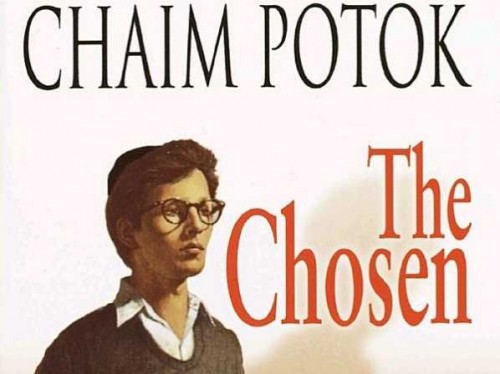
******************
From now on, let’s say, I’m only going to acquire my books at Garage Sales. And then I’m going to write about them. This, then, is the first in a series I’m super psyched about. And I think I’m going to use this opportunity, also, to get serious and personal. Well, kind of,….
******************

worth about $20
Okay, so a few days ago I bought Chaim Potok’s “The Chosen” at a yard sale close to my house. (Lately, on weekends, I’ve been trolling the neighborhoods because my wife collects teapots and it’s romantic to bring her home something nice. Last week I found a teapot it turns out was made in 1906. It’s worth about $20. Sometimes my wife, Edith, and I go hunting together and that, maybe, is the best).
When I asked the old man standing behind the table with just six books spread over it how much he wanted for “The Chosen” he took a few moments and then replied, “I dunno, how about two bucks?” I quickly countered with a shrug. And then: “how about a dollar?” And the book was mine! (note: this is how “the game” works at Garage Sales. Plus, I’m Jewish. Well, I was born into a Jewish family. I still identify, culturally. Blah. Blah. It’s complicated.) READ MORE >
August 29th, 2014 / 2:00 pm
every day i take a look at the Poem-A-Day from The Acadamy of American Poets that arrives in my email inbox because, well, it’s usually something I can laugh about if I’m in that sort of mood.
most of these poems are, of course, pale drivel. but, every now and then a real gem like this one shows up.
You’ll Know When I’m Talking to You: A Review of Michael Earl Craig’s Talkativeness
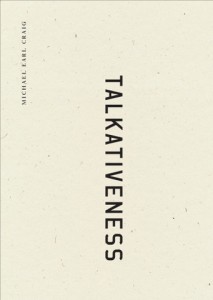 Talkativeness
Talkativeness
by Michael Earl Craig
Wave Books, April 2014
104 pages / Buy from Wave Books or Amazon
Without relying on the word “reticence” to describe the work, I would have to say that the poems throughout the collection feel withdrawn, taciturn, almost. Lurking in each one, though, is a sense of something boiling, some untapped resource, and these poems, these are the spill-over that the speaker couldn’t keep from bubbling out, like pasta water before you put the wooden spoon on the pot to keep everything calm.
The poems have in them and around them the sense of a Williamsonian take on “no idea but in things,” but they sound and read like early Williams, not Patterson Williams. The problem, if we can call this a problem, which I do not necessarily think it is, comes from how the music of the poems appear. Because the poet chooses to state the thing and not the idea, not the flourish or the afterthought, the thing itself yields only what it can yield:
I wear a light brown suit.
When I come upon you I grope you
for what seems like ten minutes.
As you have noticed.
— from “Sleepwalking through the Mekong”
and
struggling with his bags puts
his ass against my head for what
(corduroys) feels like a full
minute.
— from “What Will I Call This Poem”
Two things to note, here: first thing is that, because of his reliance on the pedestrian language, on the language of the thing and the action itself, it requires a certain precision, a boldness, even, to not inflate the action or the thing, but let the thing and the action remain what they are. This isn’t a poet hiding behind his pen. This is a poet incredibly stark and revealed to us, which allows the second realization to occur: He’s funny. That small twist of, “As you have noticed,” sounds remarkably like the joke in “This Is Just To Say,” that, yes, she probably noticed the ten minute night-groping session. Same goes for the parenthetical “(corduroys),” because it’s placed exactly where it should occur to make the joke work.
When you’re working with the onliness (to invent a word) of the thing and the action, it requires great skill to know how to place it where it should belong, to actually get more out of it than what it seems to present.
August 29th, 2014 / 10:00 am
‘I mean, it’s cool if you stay quiet, but… I like singing.’ – Conor Oberst
How I feel about blogging and social media and I guess performance in general.
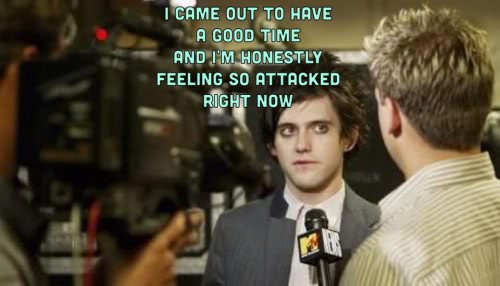
image by Rick Dangerous
25 Points: Boyhood
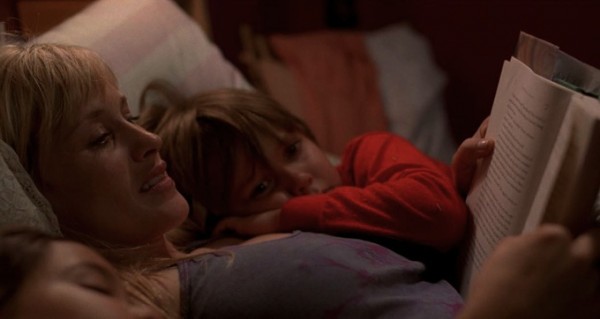
1. Boyhood resists most attempts to analyze it outside the circumstances of its creation. Richard Linklater has filmed a group of actors every year or so for more than a decade, collecting episodes that tell the story of a young boy, Mason (Ellar Coltrane), and his family. The success (and the complications) of this approach and the events depicted on-screen compete for our attention, inasmuch as we can separate them. There’s no easy engaging with Boyhood purely on the level of plot and character.
2. Linklater’s experiment gives him creative latitude with the coming-of-age story that storytellers don’t always have (or don’t always grant themselves). Mason’s mom (Patricia Arquette) marries and divorces an alcoholic, then marries and divorces an alcoholic once again. In another film, this instance of repetition might play as laziness on the part of the filmmaker; in Boyhood, it plays as a function of the film’s verisimilitude. (‘That kind of thing happens in real life,’ etc.)
3. Boyhood also complicates the manner in which a viewer distinguishes a performer from his or her character, especially in the case of the film’s child actors. We are seeing these people grow up—quite literally, if only to a point. This is unsettling at times, seeing the continued physical development of a person without having any insight into his or her actual life. And Boyhood is much better at persuading us to invest in what’s on-screen than the latest item on your Facebook newsfeed about a distant cousin’s kids.
4. Between Boyhood’s documentation of the year-by-year aging of its young actors and the film’s general verisimilitude, Linklater’s decision to preserve—on film—Ellar Coltrane’s unfortunate late-teens facial hair is at once cruel and perfectly appropriate.
5. The choice also demonstrates the perils of verisimilitude. We don’t often see facial hair this ugly in cinema; underdeveloped in a manner that makes it also appear somehow unclean, a manner that communicates its own basic misguidedness. Although Coltrane’s wispy attempted goatee makes contextual sense, it also registers (perhaps too intensely) as an aberration.
6. Boyhood really only becomes a film about boyhood after an hour or so. Until that point, the film’s attention belongs to Mason’s family as a unit. Of course, many young children spend more time with their siblings and/or parents than older children do. But I missed the focus on Mason’s larger family once it was gone. A curious viewer might wonder when and how Linklater decided on the boy as his subject, when he decided on his film’s title, etc.—again, even matters of plot will likely lead the curious viewer back to thinking about the film’s production. The conceit is inescapable.
7. A curious viewer might also wonder if Linklater merely felt more comfortable telling the story of a young, male aspiring artist than he did telling a more holistic family story—or if he worried that audiences wouldn’t turn out in the same numbers for a similar movie about a young girl.
8. Patricia Arquette in particular has an arc that’s an arc as legible as Mason’s and arguably more compelling. Linklater never abandons Arquette’s character as she navigates higher education and single motherhood, but it’s a real sadness that the movie becomes more conventional in its focus as it goes on. We can see other films within this one, and that sense of possibility is bittersweet.
9. Though in fairness to Linklater, if one looks at the range of films he has made while not attending to Boyhood—the Bad News Bears remake, A Scanner Darkly, Bernie, Before Midnight—then the narrative coherence and tonal consistency of Boyhood is remarkable, whether or not the film becomes another story of a young white dude finding himself.
10. Mason’s father (Ethan Hawke), a wannabe musician, comes and goes during the first years of Mason’s life we see onscreen. He’s a consistently inconsistent presence, someone whose life as an artist has not gone as planned—which makes his scenes valuable counterweights to later scenes of Mason discovering his own artistic ambitions.
August 28th, 2014 / 2:17 pm
25 Points: Black Cloud
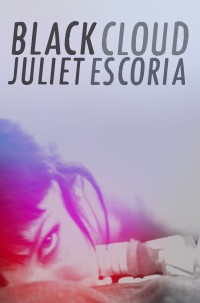 |
Black Cloud
by Juliet Escoria
Civil Coping Mechanisms, 2014
144 pages / $13.95 buy from Amazon
|
1. For some reason, I find this book really blackly funny sometimes. Maybe this is a strange reaction, I don’t know. More on this later.
2. Some of it is a bit like those bits in Breaking Bad where Jesse ‘falls of the wagon’ and goes back to taking drug and his house reflects it. I thought those bits in Breaking Bad were ok so this is a compliment.
3. This makes me think about something that may be culturally different between drug cultures in the US and drug cultures in the UK. In the UK, apart from in the eyes of the tabloid media, the law, etc., pretty much all drugs such as amphetamines, MDMA, weed, coke, acid, even, are all pretty much seen as sort of fairly clean-living party drugs and only heroin and, probably, crack are sites of visceral misery-literature style affairs, sites of crack-dens, heroin hangouts etc. The party drugs are just fine and clean-living things to anyone initiated into them with no sort of self-hatred or self-development or depression surrounding them necessarily because that’s reserved just for heroin and crack alone in the UK. This is my experience anyway but maybe everyone else in the UK would disagree. It just makes me wonder about the cultural differences as far as drugs are concerned and this book is a great example of that. Why not be honest about a common drug culture in US literature as this book and most Alt-Lit does, it screws up all those ‘wholesome’ Christian-Right bullshit images of religious-corporate America so that’s a good thing.
4. A point related to this. 12-step therapy seems different here in the UK compared to the US but also pretty similar. I like to feel these cultural differences.
5. Points 3 and 4 are maybe a thing for Alt-Lit more generally rather just this book but this book does do a good job of exemplifying something that I’ve been trying (and probably failing to articulate) and how wrong I was. More on this later.
6. “Therapists have looked at me, their eyes pleadingly wet and round, and said that growing up in a household like mine must have not felt that strange because it was all I knew. I can’t say this was true for me, not quite, because I do remember the pliancy of things, how nothing ever felt like it was happening at the right time or would stay standing up”. This is one of my favourite lines in the book because it’s also happened to me, as I grew up in a similar situation as the character in this story/author (the membrane is thin in this book, I’m guessing) and it feels true and I know it to be true and what more can you want sometimes from fiction if not some kind of truth?
7. The films that accompany this book are fucking ace by the way. Search them out on Vimeo. They’re some of the best films I’ve seen accompanying a book. I like films that accompany books. These are quite Lynchian at times and other times like a Kate Bush video somehow.
8. “Then my mother took me across the hall, closed the door, turned on the record player, Jane’s Addiction (I still hate that band)…” This is my second favourite, no my equal favourite, line in the book (from the same story – maybe I’m biased, maybe it’s why I said I found quite a bit of this blackly funny?) again because it is so true. I must be older than Julia because mine was Bob Dylan and Neil Young both of which I like now, wounds heal occasionally or sometimes you realise that it was just two contexts mixing up in an unfortunate way. Childhood memories are like this (good or bad ones, although in reality they’re always mixed) and she captures it beautifully and economically in that simple Jane’s Addiction detail. I’ll vote for this book all day on the strength of that detail.
9. This entire book isn’t blackly funny to me, by the way. Although, I wasn’t being flip when I said that, some of it is (but maybe I’m biased towards it). It couldn’t be blackly funny throughout to anybody. Some things are very sad in it, occasionally brutal. The ambivalence of life is herein. It oscillates at times, like most of, like some of, life does between extreme visceral misery and extreme visceral joy.
10. If you want poetry, consider the comparison between the two images of a mother on page 57 — one where she is modelling in a magazine and the other where she is “dirty and buzzing in the bright morning light” READ MORE >
August 26th, 2014 / 1:24 pm
Judah Hardwick: Why Should I Read YOUR Book ????
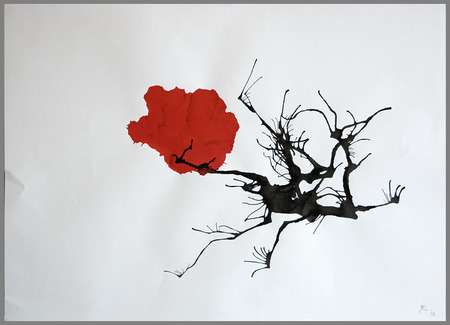
ok, Judah, so why should we read YOUR book ???
Why you or anyone should read my book? What a question! …Wait, is this coy?–or cute (you know, cute in that slanted way)? Or too eager, perhaps? I don’t want to muff this.
I won’t start off by mentioning how Rise and Shine (my book) was written during one of the worst stretches of my life, in sickness and in anger, and how I worked my nerves murderously to keep patience with it and then thinned myself to barely more than a front and back cover stripping everything down to sharpness and…and…what’s the antimorph to blurtiness?–I won’t, as buckets of blood don’t much matter to the literate consumer unless they’re dumped ministerially from time to time in the plot.
That was a long sentence. Sorry. There are not many in my book. Maybe that’ll recommend it. It’s handsomely broken up. Form, as well as the content. It’s a first-person narrative. And a first-person narrative that obeys verisimilitude.
There are no words like “verisimilitude” in my book; so no one should feel hightalked. Not to say what’s inside will turn away intellectuals, real or imagined. No. It is turned away from clunkiness. Or holds it to effect when the finely patterned sensibleness of the world collapses. You’ll see what I mean. When you read my book.

“It sure has some cover, doesn’t it?”
It is fiction. It is novella. It hews closest to the tradition of what Mark Twain called the “humorous story.” It–
It sure has some cover, doesn’t it? It tells you right off about the writing inside. The plot? You get what is depicted about a third of the way through. It resonates throughout; I’ll say that much. Although you might not know it until you come to the end. Of my book. Read it.
As it happens, there’s not much blood. It stands a chance you’ll think that funny once you’ve read my book. I’m not going to tell you here why, of course. A lot of the work I was hooting above was done so the reader would enter and wade the story as though entering and wading quicksand. While sleepwalking. It is that finicky. Sorry. But those of you who do read my book will appreciate this, and I’ll appreciate this, and we’ll all be appreciated together on some appreciable bed of daisies. Oxeye daisies. There’s oxeye daisies in my book. An invasive species in some parts of the world… (Judah Hardwick, 8/2014, Buffalo)
August 26th, 2014 / 1:21 pm
